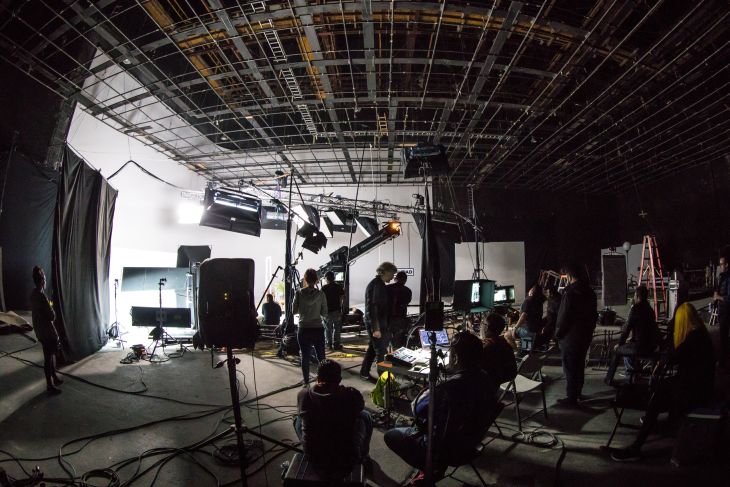 A survey of more than 500 Australian screen workers finds disabled people working in the industry face prejudice and systemic discrimination. Photo: Brands&People on Unsplash.
A survey of more than 500 Australian screen workers finds disabled people working in the industry face prejudice and systemic discrimination. Photo: Brands&People on Unsplash.
Disabled people working in Australia’s screen industry face prejudice and systemic discrimination, including lower pay, greater casualisation and stigma and stereotyping, a new report finds.
The findings, drawn from a national survey of more than 500 people – both disabled and non-disabled - and in-depth interviews, are included in the Disability and Screen Work in Australia: Report for Industry 2022, led by University of Melbourne researcher Dr Radha O’Meara in partnership with the Melbourne Disability Institute and A2K Media.
The report found that in a labour-intensive Australian screen industry employing over 200,000 people, disabled screen workers are paid substantially less than their non-disabled colleagues. Most disabled screen industry workers earn less than $800 per week, while most non-disabled screen industry workers earn more than $1250 per week.
Disabled screen workers are also more likely to be employed casually or on short-term contracts, perform unpaid work or be unemployed, compared with non-disabled screen industry workers.
Disabled screen workers also reported commonly experiencing stigma, stereotyping and exclusion at work, with 38 per cent recalling at least one unpleasant experience at work directly related to their disability status in the past year, such as being insulted, threatened, excluded from groups or denied access requirements.
Dr O’Meara said the common examples of discrimination experienced by disabled screen workers included jokes about disability and the holding of meetings without regard for the workers’ accessibility requirements – motivated by discriminatory attitudes.
“What came up repeatedly in our research was the discriminatory attitudes that disabled workers in the screen industry face, both from their colleagues and their bosses,” Dr O’Meara said.
“Disabled screen workers told us that practical issues could be solved relatively easily – and often at no extra cost – if their bosses and colleagues were willing to listen to them and work with them.”
Ade Djajamihardja is a screen producer with A2K Media, a Melbourne-based screen production company that prioritises disability pride in their purpose, identity and activity.
“I did not realise the extent of both discrimination and exclusion that I would be confronted with as a disabled screen professional. The industry was no longer accessible for me,” Ade Djajamihardja said.
“The first five meetings I tried to attend, I could not even get in the door, let alone think about working again. I love this industry, so I dug deep and worked together with the A2K Media team to use this experience as motivation to make positive and progressive meaningful change.”
The future success of Australia’s film and television industry depends on its ability to be diverse and inclusive, Dr O’Meara said.
Despite experiencing prejudice and discrimination, close to half of disabled screen workers report their lived experience of disability impacts their work in positive ways, including the potential to bring their unique skills and perspectives – such as creative thinking, problem solving, teamwork, and empathy – to their screen work.
One disabled producer survey respondent said: "We’re bringing a perspective to the table that opens your production up to maybe new audiences; different ways of creative problem solving, different ways of working.”
Dr O’Meara said: “Disabled people have so much to contribute to the Australian screen industry. We need greater participation of disabled workers in the industry, and we need these people to be fully included – to be surrounded by colleagues and bosses who really value their contributions and will work with them in flexible ways so they can do their jobs well. The screen industry can only attract and retain the best talent if it’s accessible to disabled people.”
The research was led by disabled academics in partnership with A2K Media. The Disability and Screen Work in Australia: Report for Industry 2023 is available as PDF, Easy Read summary, and Word Document optimised for screen readers.














